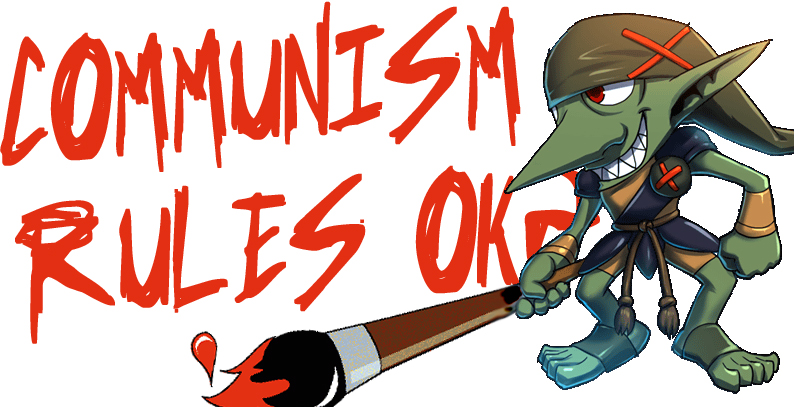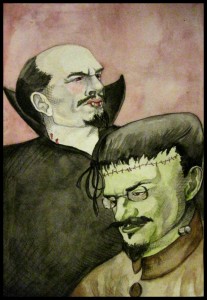
When Helen Macfarlane produced the first English language translation of The Communist Manifesto she began the text by saying; “A frightful hobgoblin stalks throughout Europe. We are haunted by a ghost, the ghost of Communism…”
I’ve always loved this evocative but, let’s face it, inaccurate translation of the manifesto’s opening line “Ein Gespenst geht um in Europa – das Gespenst des Kommunismus”. It is a delicious thing to conjure up the image of socialist revolution as some kind of seditious whisperer, carrying respectable bourgeois children into the night as recruits for its cause.
These days the line is usually rendered as “A spectre is haunting Europe — the spectre of communism” which has it’s own charms, avoids translating “Gespenst” as two entirely different things in the space of one line and doesn’t dis communism as “frightful” right at the start of a pamphlet whose main purpose is to make us feel warm and fuzzy about the idea.
However, it puzzles me that I’ve never seen anyone mention that a spectre, or ghost, is an intriguing thing to compare a living movement to. These are spirits of the dead who may well frighten the living but are, ultimately, echoes of those who have departed the world – a spectre cannot inherit the future but is a forgotten ancestor. So why would Engels and Marx choose this as the hook with which to start such an important pamphlet? Perhaps they didn’t.
Is communism a sprite or a spirit?
Both Marx and Engels were “Left Hegelians” and were attracted to Hegel’s concept of Gheist, which can be a world mind, spirit or ghost – or all three at once. Today we’re familiar with ideas like that of a ‘zeitgeist’ (the spirit of the age or moment), and the concept of an era being defined by specific moods or ideas are key to Hegel’s philosophy, and this can be seen reflected in Marx and Engels’ work.
Nowhere is this clearer, it seems to me, than in this “Gespenst” that is “haunting” Europe. I’d ask you does it not make more sense for a political propagandist to say to those radicalised by the revolutions of 1848 that “There’s a spirit sweeping across Europe, the spirit of Communism” (which is an entirely viable translation) than comparing his movement to a chain rattling apparition?
Certainly the word “haunting” here is derived purely from context and could just as easily be “walks”, “is out and about” or “travels” when decoupled from its ghoulish subject.
Hold your horses. What about the next sentence?

Despite being the second sentence of a very famous book the next line is rarely quoted and often forgotten yet appears to reinforce the imagery of Communism as spectre. We translate it as “All the powers of old Europe have entered into a holy alliance to exorcise this spectre: Pope and Tsar, Metternich and Guizot, French Radicals and German police-spies.”
It does look inconvenient for my argument, but let’s get closer. There is an explicit German word for exorcising a ghost, exorzieren, which is not used in this context. The original reads “Hetzjagd gegen dies Gespenst” which, it seems to me, can just as easily be translated as a holy alliance “ranged against this spirit” or “to drive out this spirit”. If we cling to the use of “spectre” then it makes sense to explicitly exorcise this unholy demon, but if our “Gespenst” refers to a new, radical mood… then we’re talking political opposition rather than Bible readings and incense.
I know it’s not as flowery but there is a fairly significant, if subtle, difference between the two. One’s a radical mood (spirit) and the other’s an undead apparition (spectre). We tolerate this out of place “spectre” not just because few of us ever consider the fact that we’re reading a translation rather than the original and there may be differences between the two, but also because it has, through repetition, become part of the canon. It has become the property of the prophets, so it somehow feels heretical to question the translation even when it blatantly makes no sense – as in this case.
Bring back the hobgoblin
I think I’ve made a brief but sound case to say that the classic opening line of the Manifesto is an eccentric and unhelpful way of translating the original German. But I’m going to go further. I want to argue that Macfarlane’s frightful hobgoblin is actually better than the original.

While Soviet power or land, peace and bread don’t immediately conjure up images of mischievous fairies stealing your underpants please bear with me. Goblins do things for themselves, they have agency, spectres possess people and use them for their own ends.
There has been a consistent problem on the far-left of seeing things like General Strikes, Revolutions, and indeed the working class itself as mystical events which have a special, almost religious meaning, outside of the real people doing actual things.
The Leninist Party, even when it is wholly wrong, gets to embody the holy mission towards our socialist utopia. It becomes a religious artifact whose properties are somehow more than the members and their actions because it is part of this spectre of communism.
The Stalinist tradition was particularly bad at deifying “the proletariat” and its so-called historic mission of inevitable proletarian revolution, but they were by no means the only offenders. It’s a way of divorcing your political analysis from things like facts, or knowing what you’re talking about. It’s a theology where all ethics is subordinated to “a spirit” rather than to people.
Far better, it seems to me, to see the movement as a living, breathing thing. A creature that can have children, make mistakes, roll in the mud and poke out its tongue when feeling cheeky. A political movement is made up of specific people who make specific decisions, there are no ghosts in its ranks or undead zombie masters commanding the hosts. I already regret that metaphor, but you know what I mean.
Just as no two goblins are alike, different movements have their own features. Unique personnel, strengths and weaknesses that they themselves are responsible for. I think Mark Twain said that history does not repeat itself, but it does rhyme. I believe that’s true, but I also believe that we’d be wrong to think history is going to do anything at all independently of us. I worry that this ghost, or spirit, or spectre encourages us to believe that there is a magical paper seller in the sky who has an overview of the situation and can only be accessed directly via the medium of the Central Committee’s Ouija board.
This problem doesn’t come from this one line in this one book, it underpins a great number of far-left writings, but if a hobgoblin is good for anything it’s poking a stick into a bag of hot air. Goblins love heresies, spectres are allergic to them. Goblins are flesh, spirits are ideal. You pick which one a materialist should go with.
I’ll leave you with the words of Helen Macfarlane which seem as apposite now as they were way back in the nineteenth century when she wrote them.
“All sects hedge me in with limitations. I cannot move a step in any direction without running into some creed, or catechism, or formula, which rises up like a wall between the unhappy sectarians and the rest of the universe; beyond which it is forbidden to look on pain of damnation, or worse.”
